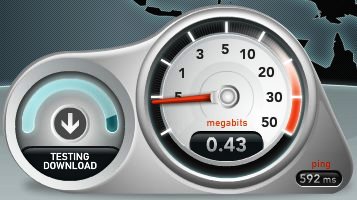Exaggerating Broadband Speeds
 The number of Internet broadband subscribers in the country will reach two million (2M) by the end of 2009. As of middle of this year, Philippine Long Distance Telephone Co. (PLDT) and subsidiary Smart Communications Inc. reported 1.2 million in combined broadband subscribers, while rival Globe Telecom Inc. reported 379,309 broadband users. Sad to say, these Internet service providers (ISPs) including those not mentioned here attained such number of subscribers using advertisements that exaggerate the broadband speeds that they offer to the public. The connection speed they promise to their subscribers are what they termed as “up to” or “bursts” speeds which are seldom reached or for just a few seconds if ever attained.
The number of Internet broadband subscribers in the country will reach two million (2M) by the end of 2009. As of middle of this year, Philippine Long Distance Telephone Co. (PLDT) and subsidiary Smart Communications Inc. reported 1.2 million in combined broadband subscribers, while rival Globe Telecom Inc. reported 379,309 broadband users. Sad to say, these Internet service providers (ISPs) including those not mentioned here attained such number of subscribers using advertisements that exaggerate the broadband speeds that they offer to the public. The connection speed they promise to their subscribers are what they termed as “up to” or “bursts” speeds which are seldom reached or for just a few seconds if ever attained.
Internet access speed is measured in data transfer rate, expressed in bits of data per second, or bps, from the web to a computer. Thus, Mbps stands for millions of bits per second or megabits per second. As the name implies, broadband offers greater bandwidth (faster data transfer rate) over a telecommunications medium compared to a dial-up Internet connection which was the only available service ten (10) years ago.
At present, broadband service providers offer Internet access speeds of 1Mbps to 2Mbps (one million to two million bits per second) to individual subscribers, with others vowing faster speeds in return for more pricey monthly plans, particularly for corporate users or small shops. In general, a high bandwidth Internet connection is one that is able to carry enough information to sustain the succession of images in a video presentation.
Exaggerating the broadband speed as usually done by ISPs poses many problems to subscribers. It is not only very frustrating for a subscriber to know that he is paying for something that he is not getting, it could also get one into trouble if he will use such exaggerated promised speed in an Internet café business.
This is what usually happen when a new Internet café owner would compute his bandwidth requirement using the ISP’s advertised speed before deciding his subscription plan. After installation, he would know that his ISP delivers much less bandwidth than what is promised so to satisfy what his workstations need, he will have to get a second subscription which means added cost to his operation.
In a press release recently, Cong. Joseph Santiago, chairman of the House committee on information and communications technology and also a former chief of the National Telecommunications Commission (NTC), urged broadband service providers to truthfully declare the true speeds of their Internet access services and to avoid misleading advertisements in their bid to seize market share.
He cautioned service providers against exaggerating the speeds of their broadband offerings and that they should be able to deliver minimum Internet connectivity at par with, if not superior to their advertised speeds. “It would be totally unfair, even highly deceptive, for them to aggressively promote their services by assuring this or that Internet access speed, only to fall short of their promise,” Santiago said.
Could this be the start of something similar to vanishing prepaid cellphone load? Would NTC do their mandated task to regulate and make sure that ISPs deliver the bandwidth they promise to their broadband subscribers? Let’s keep our fingers crossed on this.




This should be another “vanishing load” hearing.
Misleading advertisements are actually (as I believe) a violation of the consumer act. This is what I used when I filed a complaint in NTC against Smart Bro (almost 3000 pesos worth of balance was waived – I didn’t pay it cause of less 100kbps speed).
I hope the government will do something about it.
.-= dodimar´s last blog ..Liberty Presbyterian Church 16th Anniversary. =-.
[…] Read more: Exaggerating Broadband Speeds […]
[…] it has provided interesting perspectives on the state of broadband in the country. A quote from one post, ”The number of Internet broadband subscribers in the country will reach two million (2M) […]
Broadband has certainly transformed the way in which we have interaction with the internet, broadband mobile appears as though it will have a comparable effect, together with the many products and solutions coming on to the market for example smartphones etc the web may extend its reach even more and can deliver it often into some of our lives.